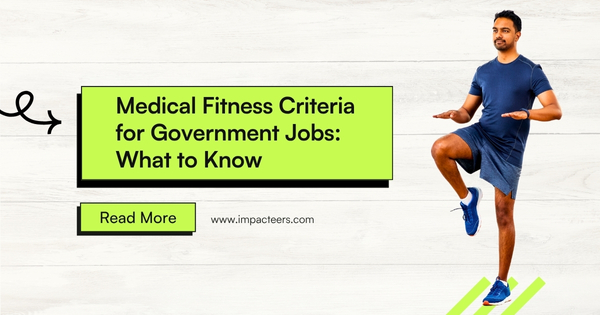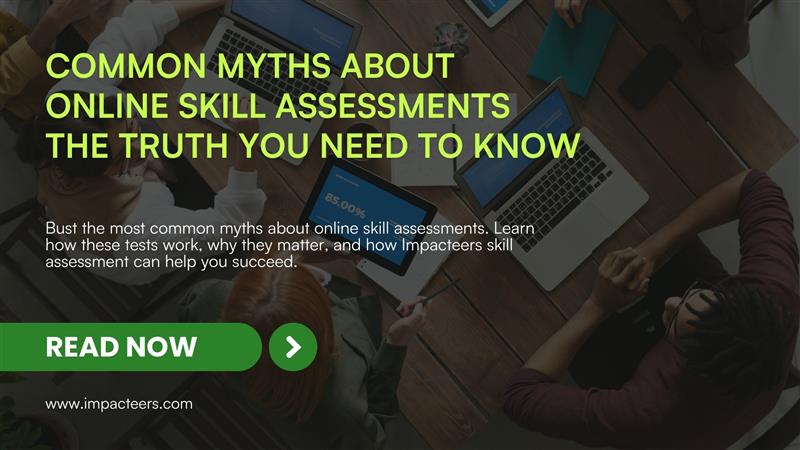Understand the medical fitness criteria for Central and state government jobs in India. Learn how freshers, graduates, engineering and computer candidates can prepare, and use Impacteers skill assessment to boost your readiness.

In India, getting selected for a government job is a dream for many—be it in Central departments like Railways, Defense, or state-level recruitments through commissions like TNPSC. But clearing the written exam or interview isn’t the final step. One critical but often overlooked stage is the medical fitness test.
From engineering and computer graduates applying to technical roles, to freshers targeting clerical and field jobs, every candidate must meet specific medical standards set by the recruiting authority. These criteria help ensure candidates are physically and mentally capable of handling job responsibilities, especially in roles involving public safety, security, and fieldwork.
In this detailed guide, we’ll cover:
- The most common medical fitness requirements
- Differences across Central and state government jobs
- What tests are conducted
- Tips to prepare for the exam
- How Impacteers’ skill assessment helps identify readiness—beyond academics
1. Why Is Medical Fitness Required for Government Jobs?
The government invests in training, pension, and long-term employment. So, ensuring candidates are physically and mentally fit for their duties is essential—especially in roles involving:
- National defense or civil security
- Fieldwork and transportation
- Law enforcement and public health
- Engineering site supervision or postal delivery
- Clerical work with long hours of desk duty
While some jobs have rigorous medical standards, others require basic wellness.
2. Who Needs to Undergo a Medical Fitness Test?
Almost all government job appointments in India require a medical examination. These include:
- Central Government Jobs like UPSC Civil Services, Railways, SSC CGL, DRDO, Indian Army, Navy, Air Force, Postal, and PSU recruitments
- State Government Jobs through PSCs such as Tamil Nadu’s TNPSC, Karnataka PSC, etc.
- Departmental roles in police, fire services, transport, health, and education
Even pass candidates applying for Group C or Group D posts will undergo basic health checks before their appointment letter is issued.
3. When Does the Medical Test Happen in the Selection Process?
The medical fitness test typically happens after you:
- Clear the written exam
- Qualify in interviews or skill tests (if applicable)
- Make the final merit list or are provisionally selected
It is the final step before you officially join the government service.
4. Key Medical Fitness Criteria (General Overview)
While the exact standards differ by job, here are some common health checks conducted:
| Test Type | What It Checks |
| Vision Test | Distant and near vision, color blindness, eye diseases |
| Hearing Test | Hearing ability using audiometry |
| Blood Tests | Hemoglobin, blood sugar, blood pressure |
| Urine Tests | Protein, sugar, kidney function indicators |
| Chest X-Ray | Respiratory health, lung clarity |
| Heart & ECG | Cardiac rhythm, abnormalities |
| General Physical Check-up | Height, weight, BMI, flexibility, spine, limb movement |
| Psychological Test (for specific jobs) | Mental stability, stress handling |
5. Special Medical Standards for High-Risk Roles
Certain jobs have advanced medical fitness standards. Examples include:
- Railway and Metro jobs (e.g., loco pilot, technician): Strict vision, hearing, and color blindness criteria
- Defense (Army, Navy, Air Force): Fitness tests include stamina, agility, height-weight ratio, mental health
- Police/Fire Services: Running, endurance, eye, and lung capacity checks
- Engineering roles in PSUs: May include substance testing and fatigue resistance
For example, in Tamil Nadu, uniformed services under TNPSC require candidates to undergo height, chest expansion, and endurance tests. This is often highlighted during TNPSC coaching, especially for aspirants targeting police, fire, and uniformed posts.
6. Vision Requirements: The Most Common Barrier
Many candidates are unaware of vision rules, which can disqualify them despite clearing exams:
- Color blindness is a disqualifier in defense, railway driver, and technical posts
- Unaided vision must meet minimum levels (6/6 or 6/9) in many jobs
- Candidates using spectacles may qualify in some clerical roles, but not in others
Always refer to the job notification for specific vision standards.
7. Can You Be Rejected for Minor Medical Issues?
Yes. Rejection can happen for:
- Color blindness or monocular vision in sensitive jobs
- Epilepsy or uncontrolled hypertension
- Drug or alcohol addiction history
- Tuberculosis (active or previously untreated)
- Severe flat feet (for roles requiring marching or standing)
- Mental disorders or history of hospitalization
However, in non-technical and office roles, leniency exists for minor conditions if well-managed.
8. What to Do If Declared Temporarily Unfit?
Don’t panic. You may be asked to:
- Take additional tests
- Provide medical clearance from a specialist
- Reappear after 30–90 days
Most temporary unfitness cases are due to obesity, borderline sugar levels, or mild BP issues. With lifestyle changes, many candidates clear the re-test. This is where Impacteers skill assessments go beyond books—offering health and personality profiling to improve your overall employability.
9. How to Prepare for a Medical Fitness Test
Start 2–3 months before expected selection
- Diet: Reduce salt, sugar, oily foods
- Exercise: Brisk walking, light cardio, stretching
- Sleep: Maintain 7–8 hours daily
- Avoid: Alcohol, tobacco, crash diets, unnecessary supplements
- Routine Checks: Visit a physician for basic health monitoring
If targeting roles in defense, railways, or police, add:
- Jogging and push-ups
- Height-weight tracking
- Eye check-ups (especially for color vision)
10. Special Medical Norms for Women Candidates
Women undergo similar tests but may also need:
- Gynecological examination (confidential and by a female officer)
- Pregnancy test in some departments (e.g., defense)
- Flexible BMI criteria in certain states
Government jobs uphold gender equality, but medical policies may differ in some postings or departments.
11. State vs Central Medical Rules
| Category | Central Government Jobs | State Government Jobs |
| Guidelines | Standardized across India | Varies by state (e.g., Tamil Nadu’s TNUSRB differs from Kerala PSC) |
| Examination Body | Central Govt hospitals or empaneled centers | State hospitals or district medical boards |
| Stringency | More rigorous in defense/railways | Moderate; varies by post |
| Follow-up Exams | Allowed for temporary unfit cases | Subject to state rules |
Even within Tamil Nadu, medical criteria differ for TNPSC, Police, and Fire Services roles.
12. How Impacteers Skill Assessment Helps Beyond Exams
Medical fitness isn’t just physical. It also includes:
- Mental alertness
- Attitude under pressure
- Cognitive decision-making
Impacteers Skill Assessment offers:
- Aptitude + psychological profiling
- Confidence-building through feedback
- Health readiness checklists
- Mock physical & stress-readiness routines for defense/railway candidates
These assessments are especially helpful for freshers and graduates who are unaware of non-academic disqualifiers.
13. Real-Life Rejections and How to Avoid Them
Case 1: Railway Technician (RRB)
Cleared written and document verification, rejected for mild color blindness.
Solution: Take a vision test before applying.
Case 2: TN Police Constable
Disqualified for underweight (BMI < 18).
Solution: Maintain a healthy diet and regular fitness during exam phase.
Case 3: SSC CGL
Declared temporarily unfit due to high BP. Cleared after 60 days and medication.
Solution: Get regular BP checkups and manage stress before tests.
Avoid surprises by staying fit year-round and using Impacteers’ diagnostic assessments.
14. Which Government Jobs Have Relaxed Medical Norms?
If you’re worried about strict fitness requirements, consider:
- Clerical jobs in SSC, TNPSC Group 2/4
- Teaching posts through TET/CTET
- Administrative jobs in PSUs and Ministries
- Computer/Data Entry roles in state offices
These usually require basic physical fitness and eyesight correction is permitted.
15. Final Health Checklist Before Medical Exam
- Carry ID and original documents
- Sleep well the night before
- Eat light, stay hydrated
- Avoid stimulants or energy drinks
- Bring prior health reports if applicable
A calm, prepared body reflects better results—physically and psychologically.
Conclusion
Getting selected for a government job in 2025 means more than clearing a written test. You must also meet the specific medical fitness criteria set by the department—whether you’re applying for a Central or state role, in a computer, engineering, defense, or clerical capacity.
Don’t leave it to chance. Start early, stay healthy, and prepare holistically. And if you need help figuring it all out, use the Impacteers skill assessment tools. They go beyond academics—into fitness, readiness, and confidence. Because your dream job deserves more than just knowledge—it needs a healthy, prepared you.
Frequently Asked Questions (FAQs)
Q1: Is medical fitness required for all government jobs in India?
A1: Yes. While the level of scrutiny varies, all Central and state government jobs require medical clearance before appointment.
Q2: What is the most common reason for medical disqualification?
A2: Vision issues (especially color blindness), uncontrolled BP, and obesity are common disqualifiers, especially in engineering, defense, or railway jobs.
Q3: Are medical standards the same for Central and State jobs?
A3: No. Central jobs follow uniform norms; state governments like Tamil Nadu may follow their own medical boards and fitness guidelines.
Q4: Can I still get a government job if I wear spectacles?
A4: Yes, for most clerical and office-based jobs, spectacles are allowed. But technical roles may require uncorrected vision or no color blindness.
Q5: How can I check if I’m medically fit before applying?
A5: You can consult a general physician or opt for Impacteers’ skill and health readiness assessment, which gives personalized insights on fitness, exam prep, and mental alertness.



Post Comment